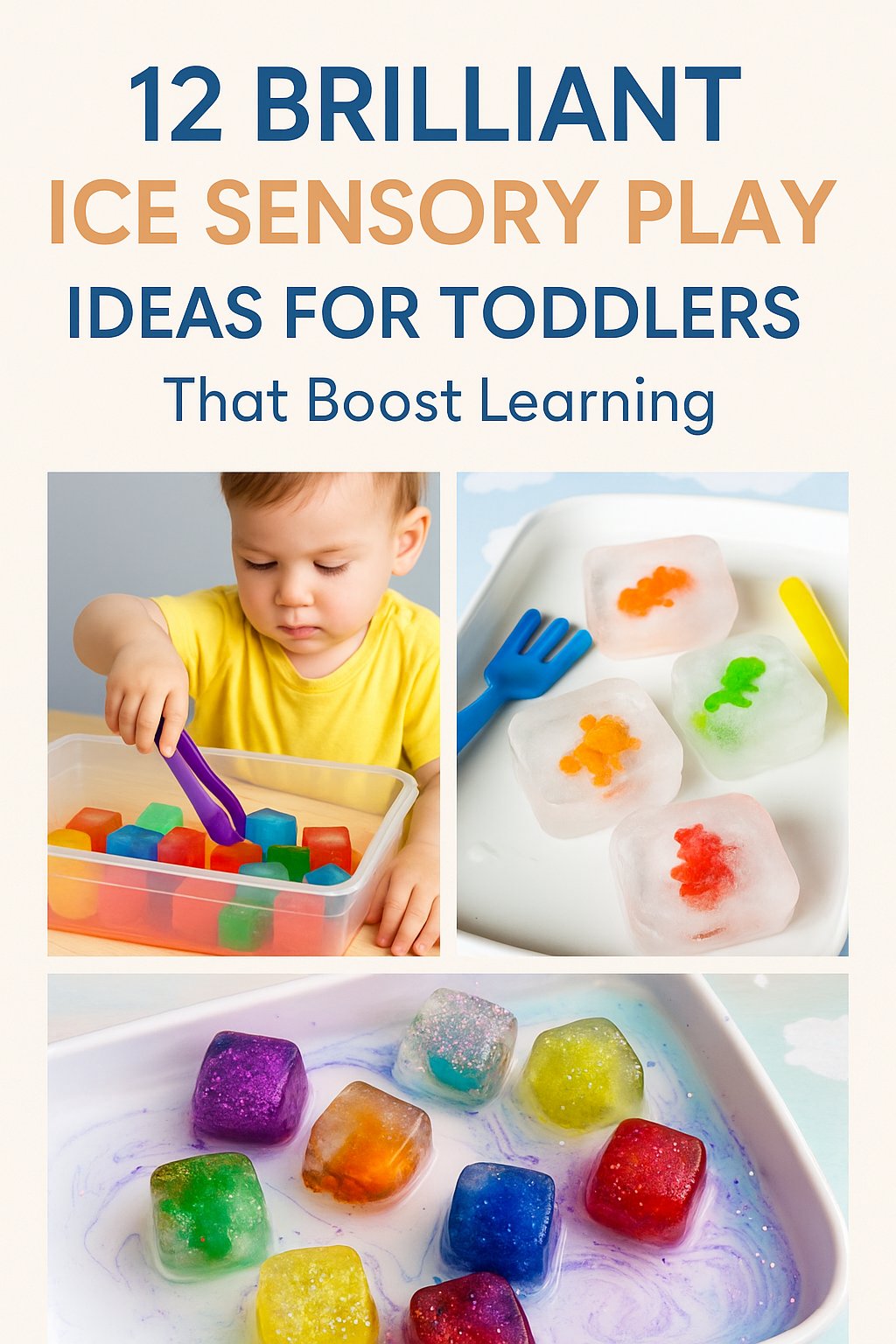Ice Sensory Play for Toddlers: 12 Brilliant Ideas + Benefits for Early Learning
❄️ Quick Summary: Ice Sensory Play for Toddlers
- What It Is: Engaging toddlers in play with ice using tools, colors, textures, and toys.
- Why It Matters: Boosts sensory development, motor skills, vocabulary, and focus.
- What You’ll Find: 12 creative activities + essential tools to get started.
- Recommended Age: Ideal for toddlers 18 months to 4 years (always supervised!).
This post may contain affiliate links. Full privacy policy and disclosure here.
Why Ice Sensory Play for Toddlers Is Worth Your Time
Ice sensory play for toddlers is more than just a fun way to cool off—it’s a science experiment, fine motor workout, and language lesson all rolled into one. These chilly activities are budget-friendly, screen-free, and incredibly adaptable for every season.
In this guide, you’ll find everything you need to start ice sensory play at home—from key benefits to activity ideas, recommended tools, and seasonal variations that align with child development.
🧠 Benefits of Ice Sensory Play for Toddlers
1. Enhances Sensory Processing
Ice introduces a new tactile experience—it’s cold, wet, slippery, and melts over time. These sensations stimulate the brain and help toddlers make sense of the world.
2. Improves Fine Motor Skills
Using tongs, spoons, and hands to scoop, transfer, and pick up slippery ice strengthens grip, coordination, and finger control—important for later writing skills.
👉 Try These Tools:
3. Teaches Scientific Thinking
Watching ice melt, mix with color, or change form introduces early STEM concepts—cause and effect, temperature, and transformation.
4. Encourages Language Development
Describing how ice feels (“cold,” “melty,” “wet”) introduces sensory vocabulary. Talking about shapes, colors, and tools supports descriptive language skills.
5. Promotes Focus and Calm
Ice sensory play can have a calming effect. Many toddlers focus quietly for longer periods when exploring cool textures.
6. Supports Independent Play
Set up the tray and let your toddler lead. Open-ended exploration helps build confidence, autonomy, and creative thinking.
🧊 12 Ice Sensory Play Ideas for Toddlers
Each idea includes variations so you can reuse materials and keep play fresh.
1. Frozen Toy Rescue
Freeze small toys in a muffin tin or silicone mold. Give toddlers warm water, droppers, and spoons to “rescue” them.
✅ Add plastic animals or mini construction vehicles for themes.
2. Color Mixing Ice
Make colored ice cubes using food coloring. Place in a sensory bin and watch the colors melt and mix.
🎨 Try natural food coloring for safer fun.
3. Ice Cube Transfer Challenge
Offer spoons, bowls, and a set of kid-friendly tongs. Ask toddlers to move ice cubes from one tray to another without using their hands.
4. Frozen Water Beads
Soak water beads, freeze them, and let toddlers explore the slippery, bouncy textures.
Safety Note: Always supervise water bead play.
5. Glitter Ice Melt
Freeze water with glitter or biodegradable confetti for a sparkly melt-and-splash experience.
6. Ice Painting
Use frozen colored ice cubes as paintbrushes on white paper or a canvas. This one is perfect for warm summer days.
7. Salt and Ice Science
Give your child coarse salt and eyedroppers with colored water. As they sprinkle salt on ice, it melts in wild patterns.
Learn more about this reaction via Science Sparks.
8. Nature Ice Tray
Freeze leaves, petals, pine needles, or small rocks in ice. Let toddlers explore and describe the textures as they melt.
Pair with our Spring Sensory Bin Ideas!
9. Alphabet Ice Excavation
Freeze plastic letters in water and provide spoons to excavate. Encourage letter naming and simple word practice.
👉 We like alphabet manipulatives for this.
10. Ocean Ice Bin
Freeze blue water and sea animals in a bin. Let toddlers explore with warm water and tools.
Explore more seasonal sensory fun in our Summer Sensory Activities.
11. Spooky Frozen Halloween Hunt
Freeze Halloween-themed trinkets (plastic spiders, googly eyes, orange beads) for a festive twist.
Pair this with Halloween Messy Play Ideas.
12. Winter Hat Ice Bag
Try our Winter Hat Sensory Bag filled with ice and small winter-themed objects for a low-mess activity.
🧺 Tools & Materials Checklist
Here are some helpful items to keep on hand:
- Ice cube trays in fun shapes
- Toddler-safe tongs and droppers
- Silicone molds
- Mini plastic toys
- Kid-safe glitter
- Plastic bin for containment
🔁 Seasonal Ice Play Extensions
- 🍀 St. Patrick’s Day: Use green water, gold coins, and rainbows → St. Patrick’s Day Sensory Bins
- 🐣 Easter: Freeze mini eggs or chicks → Easter Sensory Bins
- ❄️ Winter: Add fake snow, snowflake confetti → Winter Sensory Ideas
❓ Ice Sensory Play for Toddlers FAQ
What age is appropriate for ice sensory play?
Ice sensory play is best for toddlers aged 18 months and up, always under supervision. Use larger pieces and avoid choking hazards for younger toddlers.
Is ice play safe for kids?
Yes, with supervision and proper materials. Avoid sharp ice edges or freezing toys with small parts for young toddlers.
How long should a toddler play with ice?
10–20 minutes is plenty for toddlers. Keep towels nearby and wrap up if hands get too cold.
Can I do ice sensory play indoors?
Yes! Place a towel under a sensory bin or do it in the bathtub to contain the mess.
What skills does ice play build?
It promotes fine motor skills, language, sensory awareness, and problem-solving—all key developmental milestones.
📌 Final Tips
Want more sensory inspiration? Don’t miss our guide to the Best Sensory Toys for Kids.
Pin this post to your toddler play board and try a new activity each week!
🧊✨ Share your child’s favorite idea in the comments — I’d love to hear what worked best for your little one!

